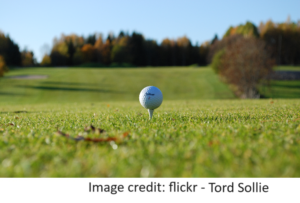This post is part of our Monthly-ish Tips series.

A client checked off a Bucket List item this year by attending the U.S. Masters Tournament. For the uninitiated like me, this is one of four men’s major golf championships in professional golf. The mention of golf in a conversation we had after their return got me thinking about a blog I wrote a long, long time ago (15 years, it turns out) that 100% stands the test of time. It’s a great reminder for us all that often the best way to build trust—and quickly—is to do the opposite of what our baser instincts advise.
In case my opening paragraph didn’t make it clear, I am not a golfer. To me, the only logical way to get that tiny little ball to travel hundreds of yards off the first tee towards that tiny little cup is to hit it as hard as possible.
If you’re a golfer, you just shook your head in dismay because you know what my strategy will yield: a nice left hook into a thick forest of trees.
Trust is like golf: neither makes sense. They’re both rife with paradox, and the more we try to insist on bringing logic to the game, the less effective we’ll be.
Off the green, the thing you’re most afraid to say or do is often precisely what will build the most trust. The best way to gain credibility fast is to admit what you do not know. The best way to close more deals is to stop trying to close more deals.
In other words, play it safe or hype your expertise or Always Be Closing and you slice the ball; take risks, be honest, relax … and land it square on the green. (Not bad use of lingo for a non-golfer, eh?)
Trust is vexing in this way. It’s also fascinating (at least to me) because of its seeming trickery.
Bottom line: it’s ridiculously simple to build more trust: embrace its paradoxical nature by making a point to do the opposite of what your baser instincts tell you to do.
Make It Real
This week, simply notice when your baser instincts get triggered: fight or flight, self-preservation, the drive to win at nearly all costs. If you can shift the dynamic in the moment, great. If not, that’s OK; self-awareness is nine-tenths of what it takes to shift the dynamic in the future. Are there patterns in your own reactions and behavior? What sparks a less trustworthy reaction for you?
Learn More
Read more about how trust is paradoxical in Chapter 1 of The Trusted Advisor Fieldbook or find out how one global firm won back a major client with a bold and paradoxical move in Chapter 3.
In partnership and paradox.
Andrea Howe
Latest posts by Andrea Howe (see all)
- Role models for healthy candor - May 27, 2025
- A small gesture (and related risk) with big trust impact (Part II) - April 1, 2025
- A small gesture (and related risk) with big trust impact (Part I) - March 3, 2025
